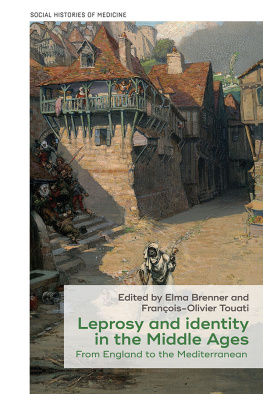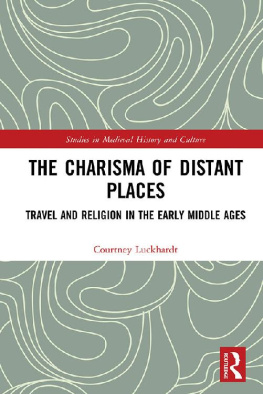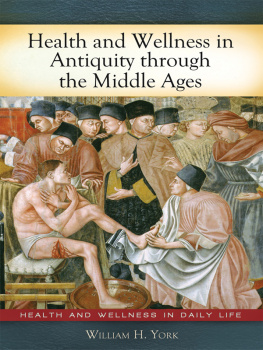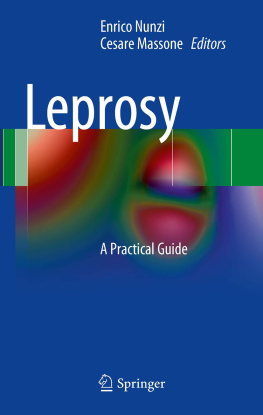Leprosy and identity in the Middle Ages


SOCIAL HISTORIES OF MEDICINE
Series editors: David Cantor, Elaine Leong and Keir Waddington
Social Histories of Medicine is concerned with all aspects of health, illness and medicine, from prehistory to the present, in every part of the world. The series covers the circumstances that promote health or illness, the ways in which people experience and explain such conditions, and what, practically, they do about them. Practitioners of all approaches to health and healing come within its scope, as do their ideas, beliefs and practices, and the social, economic and cultural contexts in which they operate. Methodologically, the series welcomes relevant studies in social, economic, cultural and intellectual history, as well as approaches derived from other disciplines in the arts, sciences, social sciences and humanities. The series is a collaboration between Manchester University Press and the Society for the Social History of Medicine.
Previously published
Migrant architects of the NHSJulian M. Simpson
Mediterranean quarantines, 17501914Edited by John Chircop and Francisco Javier Martnez
Sickness, medical welfare and the English poor, 17501834Steven King
Medical societies and scientific culture in nineteenth-century Belgium Joris Vandendriessche
Vaccinating BritainGareth Millward
Madness on trialJames E. Moran
Early Modern Ireland and the world of medicineEdited by John Cunningham
Feeling the strainJill Kirby
Rhinoplasty and the nose in early modern British medicine and cultureEmily Cock
Communicating the history of medicineEdited by Solveig Jlich and Sven Widmalm
Progress and pathologyEdited by Melissa Dickson, Emilie Taylor-Brown and Sally Shuttleworth
Balancing the selfEdited by Mark Jackson and Martin D. Moore
Accounting for health: Calculation, paperwork and medicine, 15002000Edited by Axel C. Hntelmann and Oliver Falk
Womens medicineCaroline Rusterholz
Germs and governance: The past, present and future of hospital infection, prevention and controlEdited by Anne Marie Rafferty, Marguerite Dupree and Fay Bound Alberti
Leprosy and identity in the Middle Ages
From England to the Mediterranean
Edited by
Elma Brenner and Franois-Olivier Touati
M ANCHESTER U NIVERSITY P RESS
Copyright Manchester University Press 2021
While copyright in the volume as a whole is vested in Manchester University Press, copyright in individual chapters belongs to their respective authors.
An electronic version of Chapter 12 is also available under a Creative Commons (CC-BY-NC-ND) licence, thanks to the support of the Wellcome Trust, which permits non-commercial use, distribution and reproduction provided the editors, chapter authors and Manchester University Press are fully cited and no modifications or adaptations are made. Details of the licence can be viewed at https://creativecommons.org/licenses/by-nc-nd/4.0/.
Published by Manchester University Press
Altrincham Street, Manchester M1 7JA
www.manchesteruniversitypress.co.uk
British Library Cataloguing-in-Publication Data
A catalogue record for this book is available from the British Library
ISBN 978 1 5261 2741 9 hardback
First published 2021
The publisher has no responsibility for the persistence or accuracy of URLs for any external or third-party internet websites referred to in this book, and does not guarantee that any content on such websites is, or will remain, accurate or appropriate.
Cover image: Richard Tennant Cooper, People scrambling to get away from a leper, c. 1910 (Wellcome Collection, CC BY 4.0)
Cover design: riverdesignbooks.com
Typeset by Newgen Publishing UK
Contents
Lucy Barnhouse, Ph.D., is an Assistant Professor at Arkansas State University, USA. Her research focuses on the intersections between legal, religious and medical history in late medieval Germany. Her prospective monograph, Houses of God, Places for the Sick, examines the place of hospitals in the religious and social networks of late medieval cities. She has made an edition and translation of leprosy examination letters for the Medieval Disability Sourcebook, and has been a podcaster with Footnoting History, on topics including womens history and medical history, since 2013.
Elma Brenner, Ph.D., L.M.S., is a Research Development Specialist at Wellcome Collection, London. She is also an associate member of the Centre de recherches archologiques et historiques anciennes et mdivales at the University of Caen, France (UMR 6273 CNRS). Her research explores intersections between health and religious culture in medieval France and England. Among her publications are Memory and Commemoration in Medieval Culture (co-edited with Meredith Cohen and Mary Franklin-Brown, 2013), Society and Culture in Medieval Rouen, 9111300 (co-edited with Leonie V. Hicks, 2013) and Leprosy and Charity in Medieval Rouen (2015).
Luke Demaitre, Ph.D., was Visiting Professor at the Center for Biomedical Ethics and Humanities at the University of Virginia, Charlottesville, until 2017. He has written on a range of medical notions, norms and practices in Europe before 1600, and his current study focuses on responses to striking diseases. His major publications include Leprosy in Premodern Medicine: A Malady of the Whole Body (2007) and Medieval Medicine: The Art of Healing, from Head to Toe (2013). His most recent publication, Official objectives of the Visitatio leprosorum: Ambiguity, ambivalence, and variance, appeared in Policing the Urban Environment in Premodern Europe (2019, open access).
Rafal Hyacinthe, Ph.D. (Universit Paris I, Panthon-Sorbonne), is currently in charge of the hospitaller archives in the Archives dpartementales de lHrault in Montpellier, France. His research is focused on the Order of Saint Lazarus of Jerusalem, from the Middle Ages up to the modern period. Further studies concern charity in medieval southern Italy (Ecole franaise de Rome), as well as the cult of Saint Lazarus in the East and the West (Centre national de la recherche scientifique). Along with articles and contributions in edited volumes on the history of the crusades, he has published LOrdre de Saint-Lazare de Jrusalem au Moyen Age (2003).
Damien Jeanne, Ph.D., is a lecturer at the universities of Caen and Le Havre, France. He is an associate member of the Centre de recherches archologiques et historiques anciennes et mdivales at the University of Caen (UMR 6273 CNRS). His research addresses the history and place of diseases in western medieval society. He is co-editor of Purifier, soigner ou gurir? Maladies et lieux religieux de la Mditerrane antique la Normandie mdivale (2020). Other recent publications include Lpre humiliante, lpre difiante: Hamon de Savigny, novice rput lpreux au service des lpreux, in B. Galbrun and V. Gazeau (eds), LAbbaye de Savigny (11122012) (2019); and Bndiction ou maldiction? Maladies et malades sous le regard des bndictins (XIeXIIe sicle), in P. Bauduin, G. Combalbert, A. Dubois, B. Garnier and C. Maneuvrier (eds),








